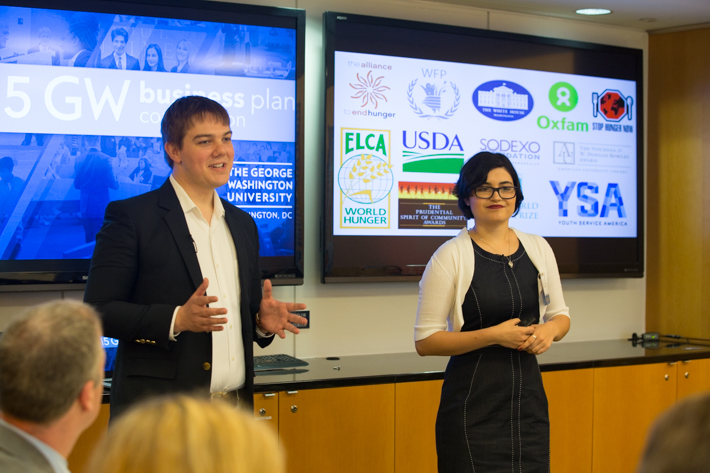Grant Nelson, JD '16, and Maria Rose Belding, his business partner and American University student, created the Matching Excess And Need for Stability (MEANS) Database two years ago. Mr. Nelson was a second year law student at the time.
The non-profit's mission is to help combat food waste across the United States. Their idea was simple: to more effectively connect food pantries and suppliers through the ease and speed of the internet. Given the rapid progress of technological innovation, Mr. Nelson found it surprising that no one had thought about building a basic notification system for foodbanks.
Mr. Nelson met Ms. Belding when she needed a place to stay at the beginning of her freshman year at American University. Mr. Nelson’s younger brother, who was friends with Ms. Belding, invited her stay at the apartment he shared with his brother. One evening, Ms. Belding took notice of Mr. Nelson writing code on his computer, which led to a conversation about how to better connect foodbanks to suppliers. Ms. Belding proposed the idea of building a foodbank-to-foodbank notification system – or as Mr. Nelson would call it, "Twitter for food banks." After calling food pantries, he realized that the world needed a more open system for identifying who has extra food, who needs it, and where it should go. In the end, what led Mr. Nelson joining Ms. Belding was the thought of building on her idea further. He envisioned a different project not only for foodbank-to-foodbank communication, but also for companies, restaurants, and distributors to donate food.
Mr. Nelson became interested in writing code the year before he began law school while he was in Thailand teaching English. An idea for a program came to mind while he was there. "I got sucked into the whole idea of building with code because you are able to create something from literally nothing, which fascinated me," he said. At GW Law, Mr. Nelson's interest in coding continued, and he found small projects to work on. One of his pre-MEANS projects was the planner ScheduleGW, built in the summer of 2014, which allows law students to easily visualize which course times overlap and plan their schedules.
It was with this growing passion that Mr. Nelson became MEANS' chief technology officer.
When MEANS launched, it was run by student staff of just over a dozen. It took some time for the non-profit to find its niche, but Mr. Nelson and Ms. Belding were persistent. One day, Ms. Belding was in class and noticed that one of their nascent users had posted varieties of canned beans they wanted to give away. This was the moment that deemed the project as a success or failure. She hoped that someone would claim the item, and shortly thereafter, someone did. This moment changed MEANS, and it proved the functionality of the website.
As MEANS' chief technology officer, Mr. Nelson was responsible for writing nearly every line of code and completing the data science for the first 18 months while he was in law school. He worked on both the website architecture and also on the business side of things, sharing his input on decisions such as potential future partners.
By 2015, Mr. Nelson and Ms. Belding were sufficiently confident of MEANS' potential. They decided to pitch the idea to GW’s New Venture Competition. They won first prize overall, in addition to "Best Non Profit," and were awarded $42,500 to help fund their startup. That same year, MEANS connected thousands of food pantries in 24 states. Since then, the non-profit has grown tremendously, now offering an online directory of food banks across 48 states. Although Mr. Nelson is no longer involved with MEANS on a daily basis, he is still in contact with the tech team and serves on the board. He revealed that MEANS recently signed several large grocery stores as clients. "They're doing great. I'm really glad," Mr. Nelson said.
Professor Roger Schechter, who first met Mr. Nelson as one of his student in his Torts course, remembers him fondly. "Grant combines a talent for tech, a knack for finding efficient solutions to annoying problems and a passion for doing good in the world. Developing the MEANS software to minimize food waste is an impressive example of his talents. GW Law can be justifiably proud of him."
Mr. Nelson recently passed the bar and is employed in Washington, D.C. Describing how GW Law helped the growth of MEANS, he said, "I took a fair number of business and tech classes that were really helpful because analyzing the law side of business made me much smarter when it came to making strategic [business] decisions." Mr. Nelson noted that GW Law's coursework and collegial atmosphere contributed to the nonprofit's success, saying, "MEANS would not have been a success without the support of GWU and the skills I received during law school."
To current law students, Mr. Nelson emphasized the importance of getting involved. "The more you are exposed to, the better equipped you are no matter where you end up."
Coverage of the MEANS project includes The Washington Post, The Huffington Post, The National Journal, GW Today and DC Inno.



